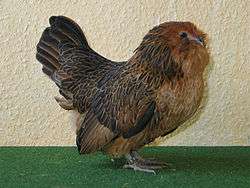Barbu d'Anvers
The Barbu d'Anvers, Dutch: Antwerpse baardkriel, is a breed of bantam chicken from Belgium. It is a true bantam, and has no full-sized counterpart; males weigh about 700 grams and hens about 600 g. The Barbu d'Anvers is one of the oldest bantam breeds, and is thought to have originated in the province of Antwerp (French: Anvers) in northern Flanders. It is the only Belgian bantam breed not threatened with extinction. In the United States it may be called the Antwerp Belgian or Belgian Bearded d'Anvers.
 | |
| Other names | |
|---|---|
| Country of origin | Belgium |
| Traits | |
| Weight | |
| Egg colour | creamy white[3]:134 |
| Comb type | rose comb |
| Classification | |
| ABA | rose comb and clean legged[4] |
| |
History
The Barbu d'Anvers is among the oldest bantam breeds, and derives from small bearded chickens of the Low Countries similar to those depicted in the paintings of Aelbert Cuyp in the seventeenth century.[2]:56 The first reliable written mention of it dates from 1858, and the first description is that of Victor La Perre De Roo in 1882. From about 1890 there was growing interest in the breed, and by 1910 the Club Avicole du Barbu Nain, the breeder's club, had nearly five hundred members.[2]:56
It is the only Belgian bantam breed not threatened with extinction. A census in 2005 found 1500 birds.[2]:56
The Barbu d'Anvers has a tail-less variant, the Barbu de Grubbe, and is the predecessor of other Belgian bantam breeds such as the Barbu d'Uccle and the Barbu d'Everberg.[2]:56 It was included the Standard of Perfection of the American Poultry Association in 1949.[4]
Characteristics
The Barbu d'Anvers is a diminutive bird with a large, round breast that juts forward, and an arching tail. As its name implies, it has a profuse beard of feathers that covers the earlobes. It has a small rose comb and small or non-existent wattles. In Belgium 29 colour varieties of plumage are recognised;[2]:56 in Germany there are six more.[5]
Use
The Barbu d'Anvers is a purely ornamental breed, kept either as a pet or by poultry fanciers for showing. Hens lay small creamy white eggs usually weighing less than 35 g; they are good mothers and good sitters.[2]:56
References
| Wikimedia Commons has media related to Barbu d'Anvers. |
- Carol Ekarius (2007). Storeys Illustrated Guide to Poultry Breeds. North Adams, MA: Storey Publishing. ISBN 9781580176682.
- N. Moula, M. Jacquet, A. Verelst, N. Antoine-Moussiaux, F. Farnir, P. Leroy (2012). Les races de poules belges (in French). Annales de Médecine Vétérinaire 156: 37-65. Accessed August 2014.
- Chris Graham (2006). Choosing and Keeping Chickens. London: Hamlyn. ISBN 9780600614388.
- APA Recognized Breeds and Varieties: As of January 1, 2012. American Poultry Association. Archived 4 November 2017.
- Liste des races et variétés homologuée dans les pays EE (28.04.2013). Entente Européenne d’Aviculture et de Cuniculture. Archived 16 June 2013.
Further reading
- J.-M. Larivière, J. Detilleux, P. Leroy (2011). Estimates of inbreeding rates in forty traditional Belgian chicken breeds populations = Schätzung des Inzuchtgrades bei vierzig einheimischen Belgischen Hühnerrassen. Archiv für Geflügelkunde 75 ( 1): 1- 6.